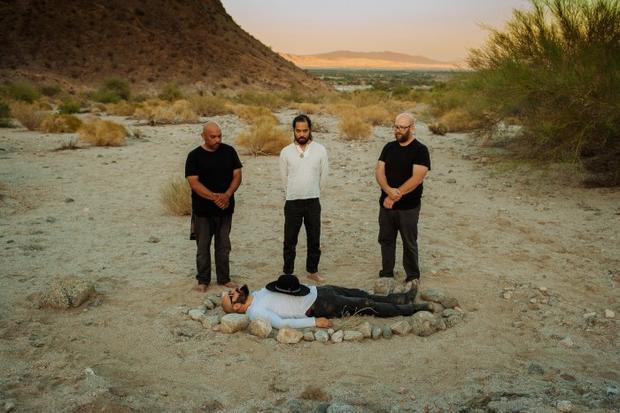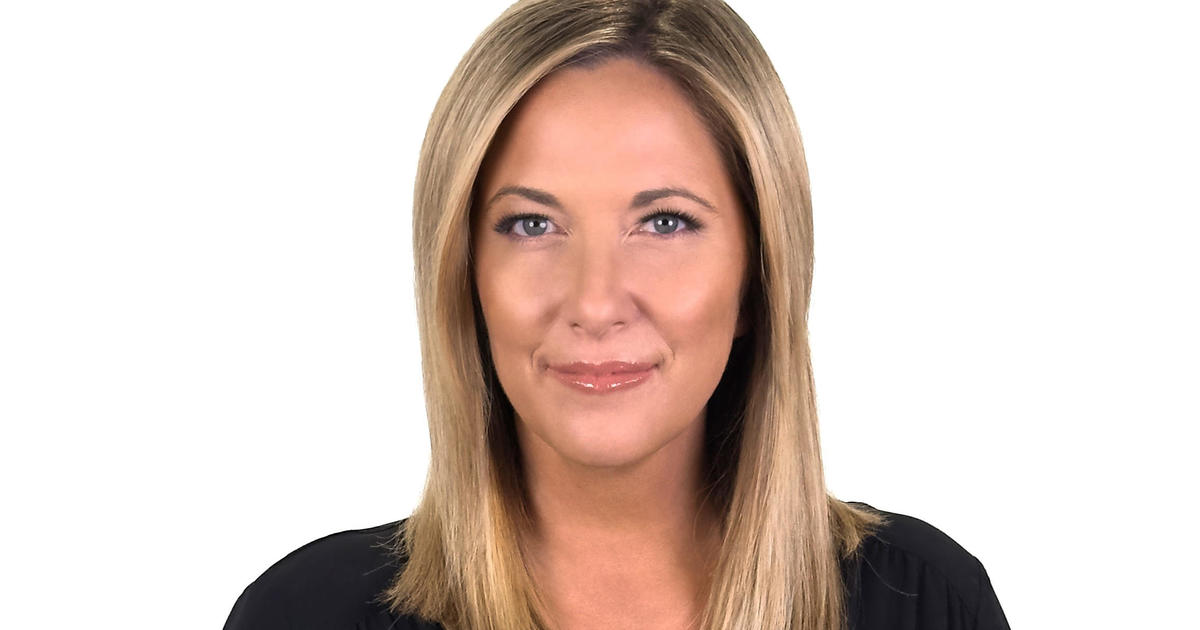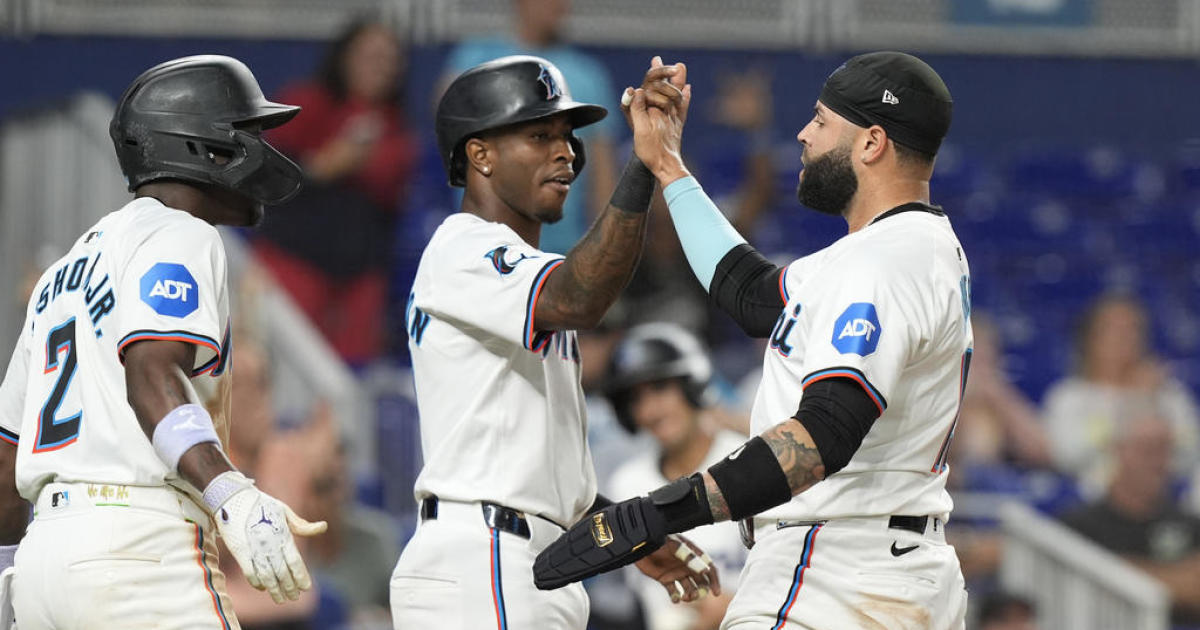CBS SF Talks To Here Lies Man Guitarist Marcos Garcia
By Dave Pehling
SAN FRANCISCO (CBS SF) -- With his hands fairly full as a longtime member of NYC-based Afrofunk revivalists Antibalas and a busy solo recording/producing career under the moniker Chico Mann, it's a bit surprising that multi-instrumentalist Marcos Garcia decided to add yet another project with his Fela Kuti-influenced heavy psych band Here Lies Man.
[bandcamp width=100% height=120 album=370222511 size=large bgcol=ffffff linkcol=0687f5 tracklist=false artwork=small]
The band -- described not inaccurately in promotional materials as the answer to the question "what if Black Sabbath played Afrobeat?" -- just released its debut album on stoner rock/psych label Riding Easy Records last spring, but it has already made significant waves in the psychedelic underground. Conjuring a hazy, fuzzed-out vibe that hearkens back to long obscure Zambian and Nigerian psych-funk groups like Witch, Musi-O-Tunya, The Funkees and Ofo the Black Company who have enjoyed a resurgence in interest thanks to modern reissue campaigns by the Soundway and Now-Again labels, Here Lies Man immediately struck a chord with fans and earned rave reviews.
While Garcia has had a full calendar with the release of the first new Antibalas album in five years -- Where the Gods Are In Peace, which came out on Daptone Records in September -- he also seems to be ramping up activity with Here Lies Man. The quartet played a couple of its earliest live shows supporting Antibalas on a fall tour ahead of releasing the new four-song Animal Noises EP that features a cover of the Fela classic "Sorrow, Tears and Blood" while finishing up preparations for the group's second album. Garcia recently spoke with CBS SF about how the band came together and their plans for the future.
CBS SF: I'm not sure how your band snuck up on me as a longtime fan of both Antibalas and global psych. The debut album you put out Riding Easy Records earlier this year is great! I know you and your drummer Geoff Mann first played together in Antibalas, but how long were you both in the band together before he moved to Los Angeles?
Marcos Garcia: I guess Geoff moved to LA about ten years ago. But he's sat in with us [Antibalas] intermittently over the years. And I'm still in the band. We just got off the road after a two-month tour that had a couple of dates with Here Lies Man opening for Antibalas.
CBS SF: I had at least one friend who attended that show in Oakland at the New Parish that the band played. I'm sorry I missed it. How was the reception from Antibalas fans? It seems like both bands have the African/Afrobeat element in common, but Here Lies Man is definitely a different sound. Did it throw some of the Afrobeat fans off?
Marcos Garcia: I don't have the answer to that question, but I will say that the each of those nights in Mill Valley and Oakland, I was anxious. These people were coming and expecting the Antibalas experience which is very uplifting and has an inspirational quality to it. And I'm thinking to myself, 'How are they going to react to this much more furious take [on African music]?" Antibalas has a ferocity to it, but it's horn driven. This is ferocious and it's guitar driven.
CBS SF: I'd say it's got a darker tone...
Marcos Garcia: It's got a much darker vibe. I was wondering how it was going to go over. But honestly, as we walked out on the stage, it seemed like there were people who already knew. I was expecting no one had heard of us, but the reception was so overwhelmingly positive. I was really blown away by it and so grateful. My feeling was that people really appreciated it, and that felt wonderful.
I think it also raised the intensity level for Antibalas when we played after Here Lies Man. Those three nights, Antibalas played really hard and gave everything. Halfway or three quarters of the way through the Antibalas set, I was starting to fade, because I had been going for hours. It was a lot of psychic energy being expended [laughs]...
CBS SF: So when you and Geoff reconnected when you moved to LA, did you already have this idea of pursuing something that was a little more psychedelic but still rooted in an African sound? It seems like from what I've been reading it was essentially just the two of you who recorded that first album.
Marcos Garcia: I had been wanting to put this project together since Antibalas recorded Security in Chicago in 2005. So with Chico Mann and Antibalas and touring and studio stuff, it wasn't until 2012 that I started to try to find the right drummer. I knew that was the essential part; I could play the other parts, but I had to get the right drummer. When I moved to LA, it was with the intention of starting the band here.
I had mentioned the idea to Geoff when I arrived and basically two weeks after I got here, we got together and I realized, "Oh my God! I had move out here to do this with you!" Very clearly it was him on the drums that made it sound the way that I heard it in my head. I had little demos that I'd tried with different drummers and it didn't feel right, but since Geoff had grown up as a rock and roll kid who fell in love with Afrobeat and was from the jazz world, we're referencing the same things. His fills and the touch and feel, it was the perfect fit.
CBS SF: So how did you connect with the other two members? Were they people you already knew in LA or was there an audition process?
Marcos Garcia: We auditioned for the bass and we were auditioning for the keyboards. That chair is kind of still...I'll get back to that. Richie Panta played percussion on the album. He's a longtime friend who I've known through Antibalas for a long time. So it was actually the three of us that recorded the album. Then we auditioned for a bass player and found the perfect bass player, which is uncanny.
His name is JP Maramba. And as far as the search for the keyboard player, right now we have to players. One is Antibalas' keyboard player Will Rath and the other one is LA-based. His name is Tyler Cash. So we've been kind of figuring out who can do what show when. It's kind of a commitment.
CBS SF: I know you've already recorded a second album that I imagine is coming out sometime early next year after the release of this new EP in November. Did the writing or recording process change with the addition of the new members?
Marcos Garcia: It's going to change for the third record. I had a strong sense of urgency to put out the first record. I wanted it to sound garage-y and kind of archival in a way. So with the second record, I wanted to expand the concept. Basically, I wrote all the material and arranged it with Geoff and do the basic tracking. With the limited time between tours and producing music for other people and remixes, just all of life's obligations and work...my brain can't rest until a project is done.
We're actually handing in the tracks to be mastered tomorrow. So for the second record, I was really clear about what I wanted it to sound like and feel like. I think it's probably the thing I'm most proud of any record that I've made. Everything I've learned and everything I've wanted to do as far as the sonic palate, and even more so the visceral reaction that I want people to have when they hear it, I feel like all of those notes were hit. I'm really excited about that. For the third record, I haven't started writing it yet, but that approach is to include the members of the live band.
CBS SF: So have you had a chance to tour on your own as a headliner yet?
Marcos Garcia: No, that's coming in February. We're doing two weeks in Europe headlining shows and I'm super excited for that. I'm not one to ever be super emotive about shows. Once it's over, I usually won't think about it or listen to it. But those shows that we did in Northern California were really special. There was some magical feeling to it. Part of it is built into the music and the musicianship and the execution.
But part of the idea of the live show is to expand on everything on the record. The record is a distillation of ideas. The live show is meant to explore them. On a Fela record, there's no distillation of the idea; you're getting the exploration and everything warts and all over the course of 15 or 20 minutes.
I'm not trying to do that. I'd rather save that for the live show. I'd rather have every performance of every song be different and unique and have an explorational approach. It's kind of the thing I've been preaching a bit to Antibalas. We're not just playing songs and notes. We're orchestrating a moment in time and we have to be responsive and completely present to allow for this transcendent moment to happen. That's just kind of my philosophy now.
CBS SF: I really like the fuzzed-out version of "Sorrow, Tears and Blood" from the new EP. Is it imposing covering Fela songs at this point, or given your involvement with Antibalas, is it just second nature at this point?
Marcos Garcia: I've done a whole series of arrangements of Fela tunes for Here Lies Man. That was my inspiration. I play mostly the tenor guitar parts in Antibalas -- the single note guitar line, these repetitive figures -- and they're riffs just like a rock riff. I just started to hear it how you would by changing the context and re-voicing it. It becomes this whole other universe, this unintended consequence of Fela's mass.
His music is so deeply internalized for me. I picked that song to record over the other arrangements I had because that was the first song that I heard of his where I just knew: that was it. I got goose bumps every time I listened to it. I clearly remember just putting it on repeat. I didn't even full understand all of the words in pidgin, but it was all about the feeling. The feeling that song created was so powerful.
From that point on, I was like, "This is my music." I just completely identified with it, The feeling of it, the syncopation, everything about it was familiar. Even though I had never heard that song before. And that overwhelming energy. It's dark and it's got gloominess to it, but it has this rebellious energy. It's very punk in a way. That all spoke to me. So the context that you're presenting him in is variable, but the feeling is the same.
CBS SF: I was reading one interview where you touched on some of the psychedelic music from Zambia and Nigeria. Did that sound contribute to the concept of the band?
Marcos Garcia: I didn't contribute at all to the concept of the band, even though I love all that music, but I didn't actually start hearing all of that until much later. I love The Funkees and Ngozi Family and Orchestre Poly-Rythmo especially -- I love that band -- but I didn't hear those bands until a few years after I heard Fela.
CBS SF: I think that was probably the case of most people, since it wasn't really readily available...
Marcos Garcia: Exactly. What I did get from that music is the sonic aesthetics of it. It's never polished. It always has this DIY feeling, way more than Fela's records to me. There's something about the immediacy and the imperfections-- whether there's something out of tune or the tape machine is a little wonky -- all of those kind of sonic traits of The Funkees and the Zamrock stuff and Orchestre Poly-Rythmo, the sonic profile, is definitely feeding into my general approach to producing music. Not just Here Lies Man, because I also produce for other people, so that affects the kind of coloration I want to capture in a production.
CBS SF: How did you end up working with RidingEasy to put the record out? This seems like a bit of a step away from a lot of the more stoner rock and psych that they release, though it still makes sense for what Here Lies Man is doing.
Marcos Garcia: I have a friend, a DJ in New York, Andrew Mason who goes by the DJ name Monk One. I called up Andrew. He connected me with Soundway Records for the last Chico Mann record. Not the one that came out this year on Bastard Jazz that was a collaborative record [Night Visions, his album with fellow producer Captain Planet]. He was the one who connected the dots and put us together.
After I finished the first Here Lies Man record, I was sending it to people and I was getting, "Yeah, it's cool! It's weird..." kind of reactions. So I thought, "I gotta send it to Andrew. He's a DJ. He might know somebody." I sent it to him and we spoke and he said, "Yeah, I'll check it out and if anyone occurs to me to send it to, I'll let you know."
That was like a Sunday evening. On Monday morning, I get a text: "I found somebody who wants to put out your record." I said, "Whaaaaat?!?" [laughs] That was a crazy turnaround. So I asked him who and he said, "You gotta meet Daniel [Hall]." I talked to him that afternoon and he said, "Yeah, I want to put out the record!" I asked if he even got to hear the whole record and he said, "I heard a couple songs and I already knew." He had an immediate response to it.
That's main thing I care about -- the only thing I care about in a relationship with a record label is that they believe in it as strongly as I do, or more; that they're really behind it And Daniel was all in. We met and then I found out he had released this Fela/Queen mash-up that came out in 2006 when he had Afrodisiac Soundsystem and I remember hearing that at one of Rich Medina Jump N Funk Afrobeat parties in New York. And I thought, "Wow! This is crazy! This is amazing"
[bandcamp width=100% height=120 album=2471650866 size=large bgcol=ffffff linkcol=0687f5 tracklist=false artwork=small track=1097229607]
There were mash-ups happening at that time in the early 2000s but I'd never heard Fela outside his own context like that. But he response to where I was coming from...he already had an appreciation for Fela and Afrobeat music and he just happens to have a rock label. And he's loving the record and wants to put out. It's uncanny. You can't make this stuff up.
CBS SF: With Daptone having put out the last couple of Antibalas albums and that label starting to branch out into psych, did you approach them about putting the album out?
Marcos Garcia: Is that a Daptone release or is that an imprint? I think that Wayne [Gordon, Daptone head engineer] is kind of the one into the psych realm. I sent it over to Neal [Sugarman, Daptone Records co-founder], but with the aesthetic that they've created, I don't think it necessarily fits into that mold. But I did share it with them.
CBS SF: I guess the last thing I wanted to ask about is if you feel a certain kinship with Budos Band, beyond what you might already have had with Antibalas playing on the same label, given their move into a sort of "Afro-doom" sound on their most recent album Burnt Offering or Brown Sabbath, the Black Sabbath cover band that Texas Latin funk band Brownout put together?
Marcos Garcia: Absolutely. We just open up for Budos in LA like a month ago. That's like family. That was the feeling of that show. And the Brown Sabbath guys, those are all the guys from Groupo Fantasma in the Austin scene. I played with [Former Groupo Fantasma guitarist and current Brownout player] Adrian Quesada in the group Ocote Soul Sounds. So we're all connected. It's a general kind of consciousness. We're all moving towards rock and roll. But it makes sense. We all come from that.




